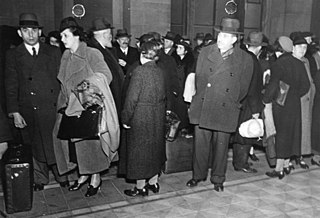Related Research Articles

Genocide is the intentional destruction of a people, either in whole or in part.

The history of Christianity follows the Christian religion as it developed from its earliest beliefs and practices in the first-century, spread geographically in the Roman Empire and beyond, and became a global religion in the twenty-first century.

Jurisprudence is the philosophy and theory of law. It is concerned primarily with both what law is and what it ought to be. That includes questions of how persons and social relations are understood in legal terms, and of the values in and of law. Work that is counted as jurisprudence is mostly philosophical, but it includes work that also belongs to other disciplines, such as sociology, history, politics and economics.

Torture is the deliberate infliction of severe pain or suffering on a person for reasons including punishment, extracting a confession, interrogation for information, intimidating third parties, or entertainment.
Public law is the part of law that governs relations and affairs between legal persons and a government, between different institutions within a state, between different branches of governments, as well as relationships between persons that are of direct concern to society. Public law comprises constitutional law, administrative law, tax law and criminal law, as well as all procedural law. Laws concerning relationships between individuals belong to private law.

Alfred-Maurice de Zayas is a Cuban-born American lawyer and writer, active in the field of human rights and international law. From 1 May 2012 to 30 April 2018, he served as the first UN Independent Expert on the Promotion of a Democratic and Equitable International Order, appointed by the United Nations Human Rights Council.
Religious discrimination is treating a person or group differently because of the particular beliefs which they hold about a religion. This includes instances when adherents of different religions, denominations or non-religions are treated unequally due to their particular beliefs, either by the law or in institutional settings, such as employment or housing.
Dhimmitude is a neologism characterizing the status of non-Muslims under Muslim rule, popularized by the Egyptian-born British writer Bat Ye'or in the 1980s and 1990s. It is a portmanteau word constructed from the Arabic dhimmi 'non-Muslim living in an Islamic state' and the French (serv)itude 'subjection'.

Sir Hersch Lauterpacht was a British international lawyer, human rights activist, and judge at the International Court of Justice.

Denaturalization is the loss of citizenship against the will of the person concerned. Denaturalization is often applied to ethnic minorities and political dissidents. Denaturalization can be a penalty for actions considered criminal by the state, often only for errors in the naturalization process such as fraud. Since the 9/11 attacks, the denaturalization of people accused of terrorism has increased. Because of the right to nationality, recognized by multiple international treaties including Article 15 of the Universal Declaration of Human Rights, denaturalization is often considered a human rights violation.

Noahidism or Noachidism is a monotheistic Jewish religious movement aimed at non-Jews, based upon the Seven Laws of Noah and their traditional interpretations within Orthodox Judaism.
Leo Kuper was a South African sociologist specialising in the study of genocide.
International law is the set of rules, norms, and standards that states and other actors feel an obligation to obey in their mutual relations and generally do obey. In international relations, actors are simply the individuals and collective entities, such as states international organizations, and non-state groups, which can make behavioral choices, whether lawful or unlawful. Rules are formal, often written expectations for behavior and norms are less formal, customary expectations about appropriate behavior that are frequently unwritten. It establishes norms for states across a broad range of domains, including war and diplomacy, economic relations, and human rights.

Law is a set of rules that are created and are enforceable by social or governmental institutions to regulate behavior, with its precise definition a matter of longstanding debate. It has been variously described as a science and as the art of justice. State-enforced laws can be made by a group legislature or by a single legislator, resulting in statutes; by the executive through decrees and regulations; or established by judges through precedent, usually in common law jurisdictions. Private individuals may create legally binding contracts, including arbitration agreements that adopt alternative ways of resolving disputes to standard court litigation. The creation of laws themselves may be influenced by a constitution, written or tacit, and the rights encoded therein. The law shapes politics, economics, history and society in various ways and also serves as a mediator of relations between people.

Sodomy, also called buggery in British English, generally refers to either anal sex between people, or any sexual activity between a human and another animal (bestiality). It may also mean any non-procreative sexual activity. Originally the term sodomy, which is derived from the story of Sodom and Gomorrah in the Book of Genesis, was commonly restricted to homosexual anal sex. Sodomy laws in many countries criminalized the behavior. In the Western world, many of these laws have been overturned or are routinely not enforced. A person who practices sodomy is sometimes referred to as a sodomite, a pejorative term.
Guo Guoting, is a former Chinese lawyer, and chief partner of the Shanghai Tian Yi Law Firm. He was one of few lawyers who would defend dissidents and Falun Gong practitioners. He represented the imprisoned lawyer Zheng Enchong and journalist Shi Tao. Because of these activities, the Shanghai authorities revoked his license to practice law. A year after he lost his right to practice and also his freedom of movement, he left for Canada.
Israeli settlements in the Israeli-occupied Palestinian territories of the West Bank and the Gaza Strip, as well as in the Syrian Golan Heights, are illegal under international law. These settlements are in violation of Article 49 of the Fourth Geneva Convention, and in breach of international declarations. In a 2024 ruling by the International Court of Justice (ICJ) relating to the Palestinian territories, the court reaffirmed the illegality of the settlements and called on Israel to end its occupation, cease its settlement activity, and evacuate all its settlers.

Strategic litigation, also known as impact litigation, is the practice of bringing lawsuits intended to affect societal change. Impact litigation cases may be class action lawsuits or individual claims with broader significance, and may rely on statutory law arguments or on constitutional claims. Such litigation has been widely and successfully used to influence public policy, especially by left-leaning groups, and often attracts significant media attention. One prominent instance of this practice is Brown v. Board of Education.
Frank Ernest Schwelb was a judge of the Superior Court of the District of Columbia and the District of Columbia Court of Appeals.

"Never again" is a phrase or slogan which is associated with the lessons of the Holocaust and other genocides. The slogan was used by liberated prisoners at Buchenwald concentration camp to denounce fascism. It was popularized by far-right Rabbi Meir Kahane in his 1971 book, Never Again! A Program for Survival.
References
- ↑ Özsu, Umut (2019). ""Emotional Restraint" as Legalist Internationalism: Egon Schwelb's Liberalism After the Fall". The Law of Strangers: Jewish Lawyers and International Law in the Twentieth Century. Cambridge University Press. pp. 167–174. ISBN 978-1-107-14041-7.
- ↑ Siegelberg, Mira (2019). "The Via Media: Egon Schwelb's Mid-century Stoic Legalism and the Birth of Human Rights Law". The Law of Strangers: Jewish Lawyers and International Law in the Twentieth Century. Cambridge University Press. pp. 143–166. ISBN 978-1-107-14041-7.
- ↑ "Egon Schwelb, Ex‐Aide Of U.N. Rights Division". The New York Times. 22 March 1979. Retrieved 12 June 2022.